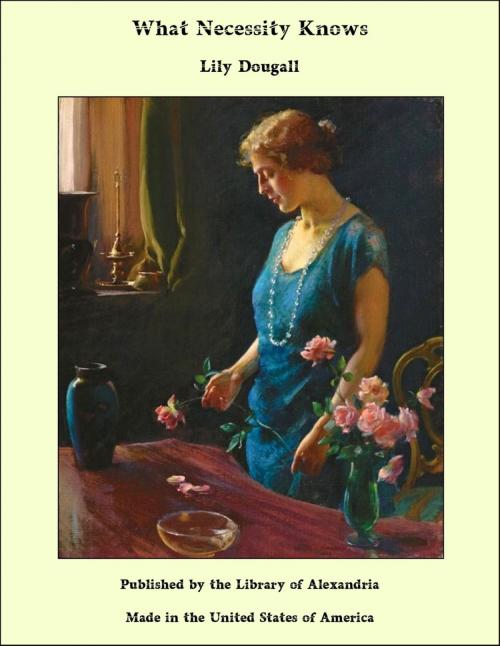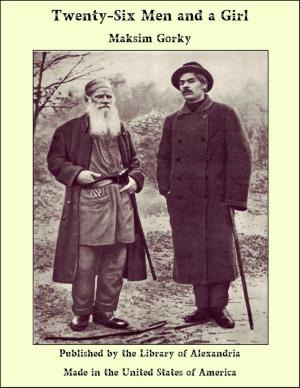| Author: | Lily Dougall | ISBN: | 9781465624444 |
| Publisher: | Library of Alexandria | Publication: | March 8, 2015 |
| Imprint: | Language: | English |
| Author: | Lily Dougall |
| ISBN: | 9781465624444 |
| Publisher: | Library of Alexandria |
| Publication: | March 8, 2015 |
| Imprint: | |
| Language: | English |
It is not often that what we call the 'great sorrows of life' cause us the greatest sorrow. Death, acute disease, sudden and great losses—these are sometimes easily borne compared with those intricate difficulties which, without name and without appearance, work themselves into the web of our daily life, and, if not rightly met, corrode and tarnish all its brightness. So spoke Robert Trenholme, Principal of the New College and Rector of the English church at Chellaston, in the Province of Quebec. He sat in his comfortable library. The light of a centre lamp glowed with shaded ray on books in their shelves, but shone strongly on the faces near it. As Trenholme spoke his words had all the charm lent by modulated voice and manner, and a face that, though strong, could light itself easily with a winning smile. He was a tall, rather muscular man; his face had that look of battle that indicates the nervous temperament. He was talking to a member of his congregation who had called to ask advice and sympathy concerning some carking domestic care. The advice had already been given, and the clergyman proceeded to give the sympathy in the form above. His listener was a sickly-looking man, who held by the hand a little boy of five or six years. The child, pale and sober, regarded with incessant interest the prosperous and energetic man who was talking to its father. "Yes, yes," replied the troubled visitor, "yes, there's some help for the big troubles, but none for the small—you're right there." "No," said the other, "I did not say there was no help. It is just those complex difficulties for which we feel the help of our fellow-men is inadequate that ought to teach us to find out how adequate is the help of the Divine Man, our Saviour, to all our needs." "Yes, yes," said the poor man again, "yes, I suppose what you say is true." But he evidently did not suppose so. He sidled to the door, cap in hand. The clergyman said no more. He was one of those sensitive men who often know instinctively whether or not their words find response in the heart of the hearer, and to whom it is always a pain to say anything, even the most trivial, which awakes no feeling common to both. Trenholme himself showed the visitors out of his house with a genial, kindly manner, and when the departing footsteps had ceased to crunch the garden path he still stood on his verandah, looking after the retreating figures and feeling somewhat depressed—not as we might suppose St. Paul would have felt depressed, had he, in like manner, taken the Name for which he lived upon his lips in vain—and to render that name futile by reason of our spiritual insignificance is surely the worst form of profanity—but he felt depressed in the way that a gentleman might who, having various interests at heart, had failed in a slight attempt to promote one of them.
It is not often that what we call the 'great sorrows of life' cause us the greatest sorrow. Death, acute disease, sudden and great losses—these are sometimes easily borne compared with those intricate difficulties which, without name and without appearance, work themselves into the web of our daily life, and, if not rightly met, corrode and tarnish all its brightness. So spoke Robert Trenholme, Principal of the New College and Rector of the English church at Chellaston, in the Province of Quebec. He sat in his comfortable library. The light of a centre lamp glowed with shaded ray on books in their shelves, but shone strongly on the faces near it. As Trenholme spoke his words had all the charm lent by modulated voice and manner, and a face that, though strong, could light itself easily with a winning smile. He was a tall, rather muscular man; his face had that look of battle that indicates the nervous temperament. He was talking to a member of his congregation who had called to ask advice and sympathy concerning some carking domestic care. The advice had already been given, and the clergyman proceeded to give the sympathy in the form above. His listener was a sickly-looking man, who held by the hand a little boy of five or six years. The child, pale and sober, regarded with incessant interest the prosperous and energetic man who was talking to its father. "Yes, yes," replied the troubled visitor, "yes, there's some help for the big troubles, but none for the small—you're right there." "No," said the other, "I did not say there was no help. It is just those complex difficulties for which we feel the help of our fellow-men is inadequate that ought to teach us to find out how adequate is the help of the Divine Man, our Saviour, to all our needs." "Yes, yes," said the poor man again, "yes, I suppose what you say is true." But he evidently did not suppose so. He sidled to the door, cap in hand. The clergyman said no more. He was one of those sensitive men who often know instinctively whether or not their words find response in the heart of the hearer, and to whom it is always a pain to say anything, even the most trivial, which awakes no feeling common to both. Trenholme himself showed the visitors out of his house with a genial, kindly manner, and when the departing footsteps had ceased to crunch the garden path he still stood on his verandah, looking after the retreating figures and feeling somewhat depressed—not as we might suppose St. Paul would have felt depressed, had he, in like manner, taken the Name for which he lived upon his lips in vain—and to render that name futile by reason of our spiritual insignificance is surely the worst form of profanity—but he felt depressed in the way that a gentleman might who, having various interests at heart, had failed in a slight attempt to promote one of them.















